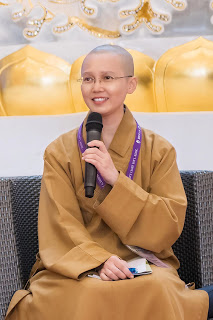
Speaker: Ven. You Deng
Fo Guang Shan Dong Zen Buddhist College, Malaysia
I. Introduction
Auspicious Greetings to all dharma friends!
This is You Deng from Dong Zen Buddhist College in Malaysia.
Nice to meet you all again.
This time, I would like to share the story of The Ten Great Disciples of the Buddha.
Each of them has own expertise and achievements. They have an indelible credit for propagating the Buddha’s teachings. To this day, they are the same as the Buddha that will be admired by future generations.
II. Purna: Foremost in Expounding the Dharma
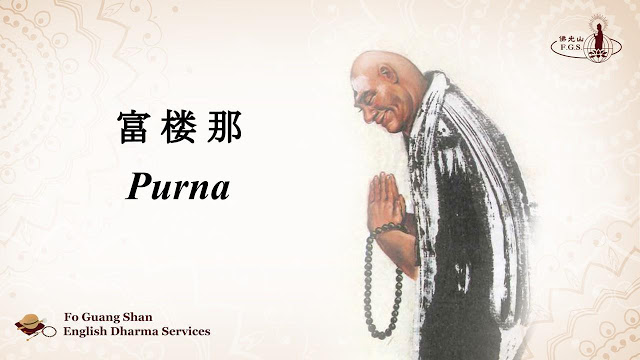
Purṇa was born in a rich family with loving parents. However he realized impermanence so he bid farewell to his family and took refuge in the Buddha. He vowed to spread the truth to liberate sentient beings. Soon, Purna attained the arhatship.
Purna is the shorter name of “Purnamaitrayaniputra,” which means boundless preaching and compassion.
Once, Buddha talked to his disciples about causation. The Buddha said, “Purna! You helped me spread the truth of the universe and liberate sentient beings. Among the preachers, you are number one. You shall attain buddhahood and your buddha name will be Dharmaprabhasa Buddha.“
Buddha’s prophecy had made the other bhikkhus very curious and surprised because Purna had only attained the state of arhat. The Buddha said,
“Fellow bhikkhus!” Purna is good in preaching dharma. He is the best among the preachers. Not only did he assist me preach the Dharma, in his past lives, he supported and helped buddhas preached the Dharma and was always praised others Dharma practitioners. All of you must learn from him!”
Due to the Buddha’s compassion and impressive virtues touched all the kings in India and they took refuge in Buddha. The kings ordered, “Any criminals willing to renounce and take refuge in the Buddha will be released.” And so some people with bad moral characters mixed into the Sangha.
Purna warned these bhikkhus, “You cannot do things that are against the rules and precepts of the Buddha. We are blessed to have the Buddha as our teacher, giving us an opportunity to repent. If you do things that damage the Sangha, not only will you harm others but also yourselves. I hope all of you practice seriously and obey the teachings of the Buddha.” The bhikkhus were touched upon hearing this.
Whatever Purna did, he always cared and worked hard for Buddhism. The Buddha often praised Purna’s admonitory role in the Sangha.
Spreading the Buddha-Dharma
Purna was very enthusiastic in his preaching. He was not afraid of difficulties when there were opportunities of spreading the bodhi seeds.
Because of Purna, many people had the opportunity of learning the truth and compassion. Purna spread the Buddha’s teachings to many places and many people took refuge in the Buddha.
A few bhikkhus asked Purna, “Venerable! Even if you taught in dissolute land, the place will turn into a holy place. When your Dharma voice appears, the people will listen earnestly. Besides the Lord Buddha, nobody can preach as well as you do. How do you have such ability?”
Purna answered modestly,
“My success in preaching is due to Buddha’s compassion. Before I preach, I pray to the Buddha hoping He will give me strength. The people are moved by the Buddha’s teachings and not because of me.”
The bhikkhus admired his modesty and continued asking, “Venerable! You are so busy in preaching the dharma and even need to meditate but you didn’t eat nutritious food to strengthen your body, what is the power that holds you?“
“Thank you for your concern. When I think of the Buddha’s great vows, what I did is really insignificant. After my preaching, I will see the Buddha and listen to his advice. The Buddha’s teaching is the best nutrient to me. I walk to various places but Buddha’s lights always protect me and His speech remains in my heart so I didn’t feel tired or tough. When I see people prostrate and pray to the Buddha, I am very moved. I pay homage to Buddha too, praying that Buddha’s teaching will help them, give them confidence and strength.”
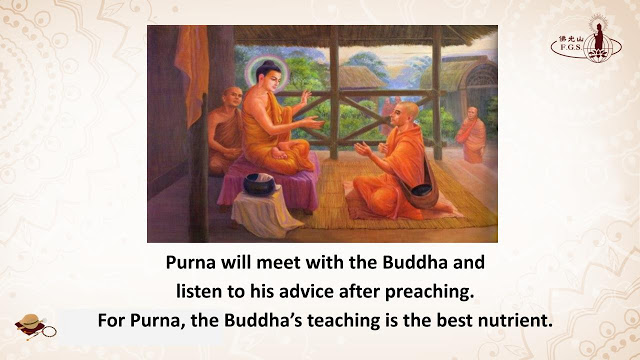
Purna was busy with preaching dharma. Except the basic necessities like clothes and alms bowl, he had no other possessions.
One day, he met a relative from his hometown. After paying respects to Purna, the relative asked, “Venerable! Ever since you left home, you have never returned to visit your hometown, everybody missed you very much. You have no wealth at all, why are you wandering around? When will you return home?“
Purna answered, “I am busy with liberating sentient beings from suffering to happiness. The four seas are my home and my relatives are everywhere. I am the disciple of the Buddha and I have the responsibility of propagating Dharma. Please say thank you on my behalf to relatives in my hometown for their concern towards me.“
“Venerable, I admired your selfless spirit for religion. When you return home, I will surely give you a very warm welcome. I hope you will bring the lights of Buddha to our hometown!“
Purna smiled and then continued his journey of sowing bodhi seeds.
Purna’s Way Of Preaching
Purna knew the Buddha’s way of preaching to liberate sentient beings. To different people, he used different methods. For instance, when he saw a doctor, he would ask, “Doctor can cure the illness of the body but can you cure greed, anger and ignorance of the mind?“
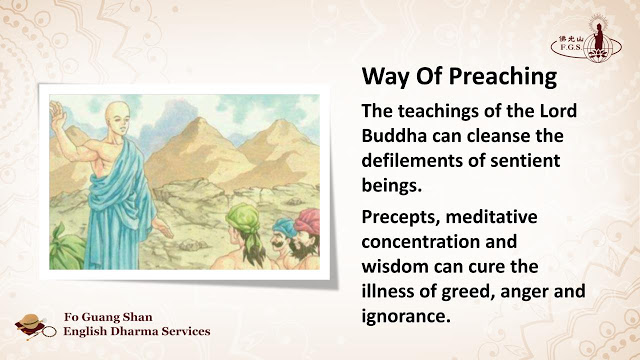
“Venerable, I can’t cure the illness of the mind, can you?“
Purna replied “Yes! The teachings of the Lord Buddha can cleanse the dirt of sentient beings. Precepts, concentration and wisdom can cure the illness of greed, anger and ignorance.“
When the person was a court official, Purna would ask, “Can you prevent people from committing crime?“
“Even laws of the country cannot prevent people from committing crimes.“ the court official answered.
Purna told “Besides laws of the country, you need to accept and obey the Dharma, the Five Precepts and the Law of Cause and Effect.”
Purna’s skilful tactics in preaching had convinced many people to take refuge in the Buddha.
Once he saw some farmers working in the field and asked, “Do you want to know the ways to plough for blessedness to increase your wisdom in life?“
“Yes, but how?” the farmers asked.
Purna replied “Have confidence in the Triple Gem, respect the Sramana, care for the sick, do charity, filial to parents, help relatives and not killing, are ways of ploughing for blessedness.“
The farmers willingly accepted his teachings.
Purna was quick-witted and flexible in his preaching, so the Buddha’s teachings were widely accepted.
Purna’s Spirit Of Teaching
Purna determinedly tackled all difficulties. Regardless of the dangers and setbacks, he earnestly spread the Buddha’s teachings.
He asked for Buddha’s permission to preach in Sudana but Buddha felt the place was undeveloped and the people were cruel and uncivilized, so he advised Purna not to go.
However, Purna said, “Lord Buddha, you loved us with compassion for which I can find no words to express my gratitude. I am willing to give all of me to Dharma and to all sentient beings to repay my gratitude to Buddha. Sudana is an uncivilized country where no preachers have been, that is why I want to preach there. I beg you, Lord Buddha, to give me permission.“
The Buddha wanted to make use of the opportunity to teach his disciples to learn from Purna:
So, Buddha asked Purna, “Purna. What if the people of Sudana refuse to accept your teachings and scold you instead?”
Purna replied, “That doesn’t matter because they are not that wilful.”
The Buddha asked, “What if they attack you with punches, stones and sticks?”
Purna replied, “That doesn’t matter as they did not injure me with knife.“
The Buddha asked, “What if they injure you with knife?“
Purna replied, “That doesn’t matter as they did not kill me.“
The Buddha asked, “What if they kill you?“
“Then I must thank them for letting me enter Nirvana and allowing me to repay Buddha’s gratitude with my life and body.”
The Buddha praised Purna in having reached the absolute perfect stage.
Purna was enthusiastic about spreading the Dharma in Sudana. He understood the 10 qualities a Dharma propagator must possess: There are
- Virtue of knowing the Dharma
- Virtue of knowing how to preach
- Virtue of fearlessness with the public
- Virtue of debating
- Virtue of tactful preaching
- Virtue of obeying the Dharma
- Virtue of possessing dignity
- Virtue of zealous progress
- Virtue of tirelessness
- Virtue of power in success
Purna memorized these ten virtues.
Although Purna propagate dharma throughout the ten years in Sudana, but he was always present at Buddha’s birthday or when Buddha made speeches in important ceremonies.
Once, while the Buddha was giving a public discourse, Purna paid homage to the Buddha in the crowd. Buddha was filled with joy and said, “Purna, we missed you very much. How are you doing in Sudana? I know you can manage in Sudana because your preaching spirit and health are good and you have very strong faith in the Triple Gem. You are compassionate, steady, intelligent and healthy. You have good debating skills and a dignified appearance. Fellow bhikkhus! Among my disciples, Purna is the number one preacher, all of you should emulate him.”
When Purna heard Budhha entered Nirvana, he rushed back to pay His Last respect. He also attended the first council meeting held by Mahākāśyapa. Purna found there were some discrepancies in the contents. After he shared his opinions in the council, he left and continued his journey of preaching dharma. Nobody knew when and where Purna entered Nirvana. People only knew that Purna always preached the Buddha’s teaching and served the sentient beings with his whole life.
III. Subhuti: Foremost in Understanding Emptiness
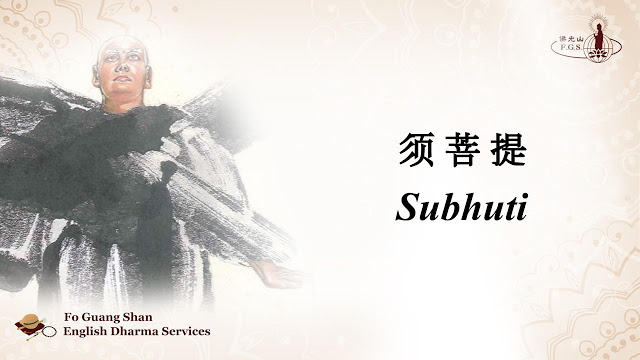
Subhuti was born into a wealthy family in Shravasti and was a relative of Anāthapindika. (Do you still remember who Anāthapiṇḍika is? Yes, last week we knew that he was the wealthy elder who donated Jetavana Vihara to the Buddha).
On the day of Subhuti’s birth, all of his family’s gold and silver suddenly disappeared, symbolizing that he was born of emptiness. The family’s gold and silver was then said to have reappeared seven days later.
Subhuti grew up in a rich family, his parents loved him very much, but he was reluctant to be a slave to gold and silver treasures. The money his parents gave him, he would gave to the poor. On the road, if he met a beggar without proper clothes to cover his body, he would take off his coat and give it to the beggar and then ran home with shorts.
Legend has it that at the time of Subhuti’s birth, an auspicious sign of emptiness marked him.
He told his parents, “Everything in the universe seems to be reflected in my heart. But my heart filled like nothing. If there are no wise saints in the world, no one is qualified to discuss with me the mood of the liberated person, and no one understands the world in my heart.
Once Buddha arrived in the hometown of Subhuti. Everyone commented The Buddha was a wise man, no one in the universe can compete with Buddha. Upon hearing this, Subhuti was curious who the Buddha was and why he had such great motivation, even Subhuti’s parents also converted to Buddhist.
So Subhūti quietly went to Jetavana Monastery to see Buddha and listened to his teaching
Subhuti hear Buddha said:
“The world should not be competing, there is no one my difference, we are all together is one.”
“All laws are born of fate and co-existence, and nothing can exist independently. Me and all laws are dependent on each other to survive, merciful favors to all beings, it seems to be for people, in fact, have great interests in their own!”
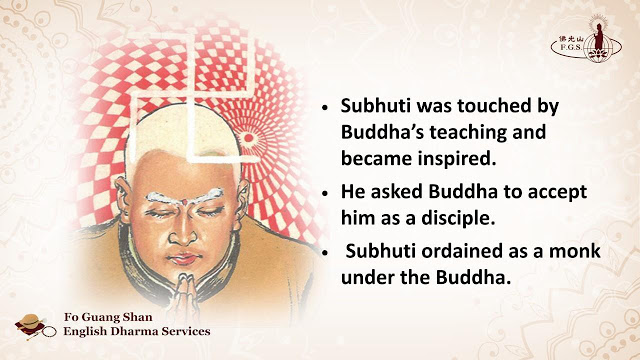
Subhūti was touched by Buddha’s teaching and became inspired. He asked Buddha to accept him as Disciple. Subhūti ordained as a monk under Buddha, eventually developing a calm mind and temperament.
A Simple Lifestyle
Subhuti led a simple life after ordination.
When going on alms rounds, Subhuti prioritized collecting alms from the wealthy. This was in contrast to another Buddhist disciple, Mahakasyapa, who prioritized collecting alms from the poor.
Mahakasyapa prioritized receiving alms from poor households reasoning that poor people needed the merit from alms-giving the most, while Subhuti explained that collecting alms from poor people increased their hardship, therefore he collected alms from rich households who would not be burdened by such giving.
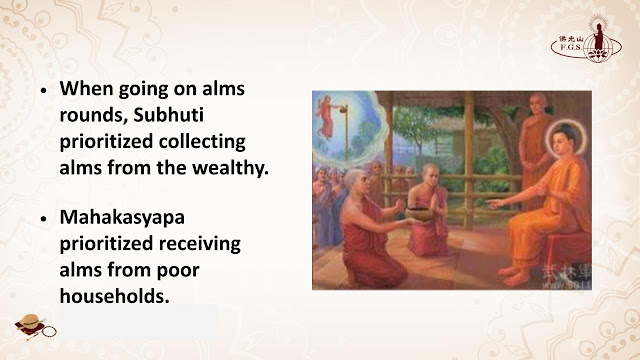
Buddha later rebuked both of them for these practices, telling them that collecting alms should be done without discrimination.
Subhuti as the Interlocuter of the Diamond Sutra
Subhūti is best known as the disciple with whom the Buddha speaks when imparting the Diamond Sutra.
Subhuti asked the Buddha:
“Lord Buddha, Tathagata protect and is concerned about all of us, but how can good men and good women abide in Bodhi’s mind ? And how can they subdue delusive thoughts?
The Buddha replied:
“To live in Bodhi’s Mind and subdue delusive thoughts, a bodhisattva should practice giving without abiding in any notion and liberate all sentient being without self.”
Subhuti felt touched after hearing this and he understood he shall not cling to the notion of a self, notion of others, notion of sentient beings, notion of longevity. Subhuti attained enlightenment and was known as foremost in understanding emptiness.
To further strengthen Subhuti faith in giving without abiding in any notion and liberating all sentient beings without self, the Buddha shared a story that he had encountered when he was a practitioner. Once his body was cut apart by King Kalinga who suspected he had an affair with his wives. To liberate the sentient being, at that time, ee had no notion of self, no notion of others, no notion of sentient beings, and no notion of longevity. He had no hatred. The loser is one who hurts others.
When the Buddha descended to Sankassa after spending the rainy season in Tavatimsa heaven, everyone rushed to welcome Him. Subhuti, recalling that the Buddha said that one can see him by meditating, Subhuti decided remaining in meditation rather than going to greet him. Upon arriving, the Buddha stated that Subhuti was the first to greet him upon his return, having seen the Buddha’s spiritual body before the other disciples greeted his physical body.
Subhuti and the Understanding of Emptiness
One day, Subhuti enter emptiness samadhi meditative concentration, many devas touched by his practice and appear in the sky, flowers began to fall on him.
“We are praising you for your discourse on emptiness,” the gods whispered to Subhuti.
“But I have not spoken of emptiness,” replied Subhuti.
“You have not spoken of emptiness, we have not heard emptiness,” responded the gods.
“This is the true emptiness.” The blossoms showered upon Subhuti as rain.
Subhuti has practiced patience even when someone criticize him. He had achieved non-contentious samadhi and attained a passionless arhat.
Under the guidance of Buddha, Subhuti understood everything in the universe arises from causes and conditions.
IV. Conclusion
Dear friends, in Indian caste system, Purna and Subhuti were born in Kshatriya families, super rich families. Once they ordained under the Buddha, they served, obeyed, and never expressed dissatisfaction with the Buddha. As Buddhist, we should learn from their humble spirit.
Thank you for joining this online English Dharma Service.
Let us join our palms and dedicate the joy and merits from this session, to all sentient beings, may all be free from suffering.
Once again, thank you for joining us. If you find this dharma service is helpful to your practice, please subscribe to the Fo Guang Shan English Dharma Services Youtube channel and share it to your friends.
Last but not least, I wish you all to stay safe, stay healthy and stay awesome. See you next week. Omitofo.

